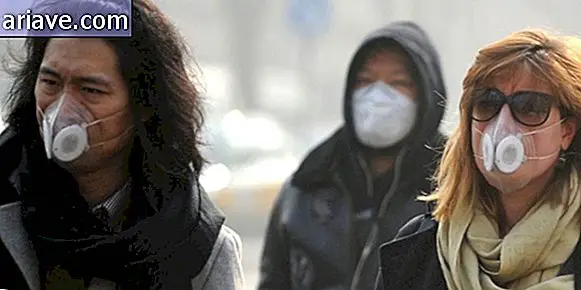After all, what is more hygienic: drying your hands with paper or dryer?
If you are a health-conscious person, you may have wondered more than once after washing your hands in a public restroom what would be more hygienic when drying yourself: using those individual paper towels or dryer systems who use air jets or hot air, found in places less often than sheets of paper?
Another issue that may unfortunately cross the minds of fewer people is the impact each of these media can have on the environment. What would be more worthwhile: producing countless sheets of paper and disposing of them, or the energy expenditure caused by air-blowing machines?
Whatever your question about hand drying outside our homes, where using a shared towel would obviously be much more unhygienic than any of the other options, let's try to clarify this question as much as possible and answer that question. which has caused great friction among stakeholders, both paper producers and dryer manufacturers.
The war between paper and dryer
Some time ago, a very sharp barbar exchange took place between professionals on both sides of this dispute: defending Dyson, the largest maker of hand-drying devices, was microbiologist Toby Saville, a company employee.
Like his antagonist, Keith Redway, author of a study that points out the defects of dryers on hygiene and known for having worked on research for paper towels supported by the European Tissue Symposium, industrial body linked to the manufacture of the product.

In the end, both had considerable motives and points in criticizing the work of the "rival." Toby Saville stated that pro-sheet work had fundamental flaws, with unacceptable errors even for undergraduates. Keith Redway defends his science by saying that extrapolated values serve to include potential risk and that it must be taken into account, too, if the subject has performed a proper hand wash.
After all, what is true?
With so much animosity and other capitalist interests involved in this unhealthy competition, the biggest victims are us, the consumers, who end up not knowing what really matters: what is best for people and the world?
When used properly, both methods can be considered very effective in getting our hands completely dry.
The first point to be evaluated is the drying efficiency that the methods are able to provide. It may seem like a minor factor, but it's not: wet hands are a dish full of bacteria, which makes moisture a favorable environment for proliferation. The drier the less susceptible your hands are to bacteria.
That's where one of the few opinions the two sides share comes in: the jet blowers dry their hands as well as the sheets of paper. Properly used, both methods can be considered very effective in getting our hands completely dry.

The enemy in this case is the hot air dryer, which can contain a large amount of bacteria (which likes warmer environments) and blow the air with little force. This leads to one more factor to consider: The slow process of the hot air driers causes people to give up in the middle and leave the bathroom with their hands still damp, which drives many more bacteria.
Wash one, wash the other ...
However, drying hands is far from an effective process for removing bacteria. This is what we actually wash our hands for. That is, the way we wash our hands is infinitely more important to our health than the way we dry them. Keeping this focus just when it is dry can take our attention away from what is really important.
Only 32% of men and 64% of women have proper hand hygiene.
No wonder there are several campaigns to encourage hand washing after using a toilet, especially in delicate areas such as hospitals and restaurants. Still, that's not what you see out there. A survey done in the UK by the BBC asked people if they washed their hands after using the toilet.
The response was positive in 99% of cases. However, in practice, the result was quite different: with devices that recorded the use of taps by bathroom users, only 32% of men and 64% of women had proper hand hygiene.

Hand Dryer: A Bacteria Bomb?
What is widely held in academic opinion, to the delight of papermakers, is that dryers would be the worst method of drying hands, especially in the case of hot air blowers.
Several studies by the University of Westminster, Leeds, the Massachusetts Institute of Technology (MIT), and other papers published by the Journal of Applied Microbiology show that using the method that uses air blowing increases the number of bacteria in our hands and worse. : They spread microbes through the air, deeply contaminating the environment.

Research shows that air-jet dryers disperse 60 times more bacteria in the air than hot air devices and 1, 300 times more than paper towels. Also, the longer delay in the drying process causes people to give up the method. Studies have shown that drying hands on dryers takes 30 seconds of action.

The downside is that this causes people to quit in less time (by 19.6 seconds for men and 25.4 seconds for women, a little more patient). Using paper towels would only take 11 seconds of our precious lives. The leaves would still help physically remove debris from poorly washed hands, proving to be more effective than blowing air.
And the environment?
If we stop to look at hand drying methods by blowing air and paper sheets, we can see both positive and negative points in terms of environmental good. If, on the one hand, paper production requires cutting down trees and generating a large amount of waste, dryers consume a huge amount of electricity, which generates an environmental impact according to the source of the electricity used.
Using paper sheets would cause a 70% greater “carbon footprint” than the most advanced technology among dryers
At the request of Dyson, the manufacturer of air blower devices, MIT has reviewed the life cycle of the most common hand drying methods in public toilets, including the use of cloth and paper towels and various equipment that emit hot air jets or cold.

The result? Using paper sheets would cause a 70% greater “carbon footprint” than the technology considered most advanced among dryers. Understand “carbon footprint” as our environmental “trail” in the world, ie the record of how much carbon dioxide is produced daily by our practices and our consumption, and how these gas emissions influence the environment.
Interests in the play
Of course, we cannot ignore the fact that the study was commissioned by its biggest beneficiary: the company that makes the hand dryers. Perhaps it is a way the company uses to compensate for poor results when evaluating the most hygienic method and the paper sheets have won. In any case, with so many interests involved in an industry that generates so much money annually, it is very complicated to hit the hammer and state what the truth is.
Using two sheets of paper towels emits 56 grams of CO 2, and using a hand dryer for 30 seconds throws 9 to 40 grams of CO 2 into the atmosphere.
We can take into account more details about the production of paper sheets. If they are made from reforestation trees, the “carbon footprint” is considerably smaller. Products made from recycling, for example, can also greatly help to preserve the environment.
Still, given the current average output of both hand drying methods, The Climate Conservancy, founded by scientists at Stanford University in the United States, says using two sheets of paper emits 56 grams. CO 2, and using a hand dryer for 30 seconds pours 9 to 40 grams of CO 2 into the atmosphere.
Make your choice
In the end, we may come to the conclusion that drying our hands with paper towels is more hygienic but more environmentally friendly. Blow dryers can contaminate your hands and infect air with bacteria, but will have a much lower environmental impact than the first option.
Still, more important than that is the way we wash our hands
Still, more important than that is the way we wash our hands. The practice is considered among doctors the single most important measure as a strategy to reduce the incidence of nosocomial infections, that is, it is very important and makes a lot of difference to our health. With well-washed hands, the use of some kind of antiseptic and, of course, without wasting water, the drying method just becomes an adjunct in the protection of health and the environment.
Via TecMundo.
* Posted on 5/5/2016











